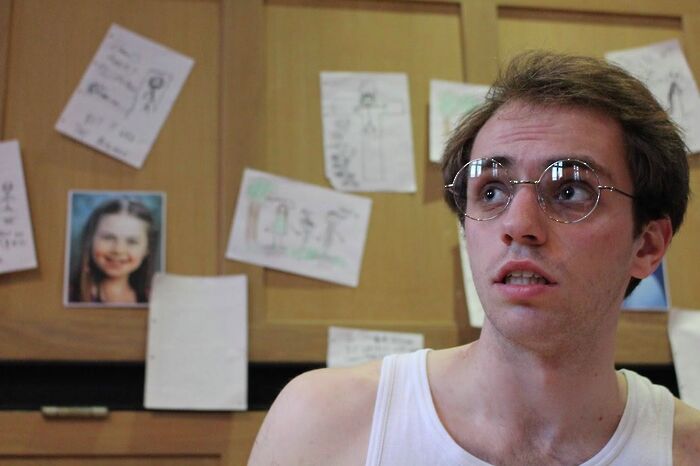Violet review
Despite a seamless orchestra, and some standout performances, this musical is let down by disparate storylines, technical issues and ambiguous characterisation

Violet is an offbeat 1997 musical about the experience of being an outsider. It focuses on Violet’s poignant but plucky quest for restoration, after her face is so disfigured by an axe accident that it sparks horror wherever she goes. It’s about the sustained pain of being an outsider and negotiating a world where no one looks at you neutrally: this isn’t just true for Violet with her scar, but also Flick, a soldier whose first interaction in the show is with a racist waitress. With such a focus on inclusiveness, it’s encouraging that the production team emphasised racial diversity in the casting process and exhorted disabled performers to apply. In Varsity’s preview of Violet, Jasmine Thien commented that her experience of blindness gave her the ability to relate to Violet, whom she plays very naturalistically.
"It’s a challenging musical, and one which may have proved too much for this production"
It’s unfortunate, then, that a musical concerned with integration and personal wholeness should feel so incohesive from the get-go. Many lines in the opening number are lost to poor diction and projection; the choreographed movement feels shaky, and the tone of the song (and the whole show) is uncertain. You feel, uncomfortably, that Jeanine Tesori’s music and Brian Crawley’s libretto (which has itself been criticised for being unrealistic and formulaic) have quickly gotten on top of the cast.
From this point onwards, despite the efforts of the seamless orchestra and some standout performances (more on those later), Violet never seems to stop struggling. More lines are lost to garbled diction and a failure to project (which I suspect is due to uneasiness with the Southern American accent- one audience member commented that the show might have benefitted from dropping this). More still are swallowed by the volume of the orchestra: but this is a technical issue which I’m sure will be resolved by the next performance. As a result, though, the story is hard to follow, and many interactions don’t make a lot of emotional sense.
For example, the relationship between young Violet (played by Louisa Stuart-Smith who is, by the way, impressively convincing and stirring as the recently traumatised child) and her father is fraught: that’s for sure, but we never get to the bottom of why, or what happened with the axe. At one point there’s a pretty incredulous suggestion that her father, who can never seem to decide if he’s loving, abusive or just plain ambivalent (and at one point appears to have lost all his memory, but we don’t get an explanation for this) aimed the axe at Violet’s head on purpose. Is he a murderous villain? Did he, as young Violet suggests, want to stop her from being pretty so she wouldn’t leave him? Did he take her to get stitched up by a drunk doctor on purpose? All these chilling suggestions, which would surely shift the story towards a Bloody Chamber-style gothic fantasy, are raised and then never picked up on again: much less tied up. Other characterisations are just unconvincing, or feel incoherent in their motivations. However, I couldn’t tell you whether this is a fault of the script, or whether clarification took place in the lines I couldn’t hear.
All this being said, Violet has its tender and engaging moments. Brandon Lino as the charismatic Monty is very accomplished, and his confident mastery of the soldier’s physicality and sometimes-playful-sometimes-earnest delivery holds together a relationship arc which doesn’t quite ring true otherwise. He sings very well with great projection, giving some of the best performances of the show. Similarly, Thomas Cox’s Preacher is great fun to watch: he seems completely at ease in the lively, cynical televangelist role, waking up the stage with his larger-than-life, polished-to-the-point-of-slippery characterisation and perfect command of Southern pronunciation. Lucie Richardson and Nusrath Tapadar are also outstanding ensemble members: Violet could have really benefitted from making more use of their talent and command of the stage. I expect that other ensemble members would have also been impressive if their microphones had been loud enough: it was very unfortunate that they were largely inaudible, but again this can be easily resolved for the next show.
West End and off-Broadway performances of Violet have consistently received mixed reviews, often due to shortcomings of the script which no director or cast, however talented, have quite been able to convincingly overcome. It’s a challenging musical, then, and one whose demanding vocals, ambiguous characters and somewhat scattershot storylines may have proved too much for this production.
 News / Eight Cambridge researchers awarded €17m in ERC research grants27 December 2025
News / Eight Cambridge researchers awarded €17m in ERC research grants27 December 2025 News / Clare Hall spent over £500k opposing busway 24 December 2025
News / Clare Hall spent over £500k opposing busway 24 December 2025 Comment / League tables do more harm than good26 December 2025
Comment / League tables do more harm than good26 December 2025 Comment / The ‘class’ of Cambridge24 December 2025
Comment / The ‘class’ of Cambridge24 December 2025 News / Caius mourns its tree-mendous loss23 December 2025
News / Caius mourns its tree-mendous loss23 December 2025









